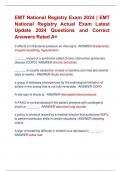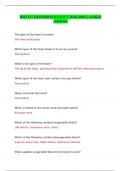EMT National Registry Exam 2024 | EMT
National Registry Actual Exam Latest
Update 2024 Questions and Correct
Answers Rated A+
3 effects of intracranial pressure on vital signs -ANSWER-bradycardia,
irregular breathing, hypertension
___ ___ is part of a syndrome called chronic obstructive pulmonary
disease (COPD) -ANSWER-chronic bronchitis
___ ___ is usually caused by viruses or bacteria and may last several
days or weeks. -ANSWER-Acute bronchitis
a group of diseases characterized by the pathological limitation of
airflow in the airway that is not fully reversible. -ANSWER-COPD
A late sign of shock is: -ANSWER-decreased blood pressure
A PASG is contraindicated if the patient presents with cardiogenic
shock or _______. -ANSWER-abnormal lung sounds
a policy or protocol issued by a medical director that authorizes EMTs
to perform particular skills in certain situations -ANSWER-standing
orders
A sign of breathing difficulty in children is a decrease in ___ ___. -
ANSWER-pulse rate
,A sudden loss of _______ of blood is considered serious in an
average adult. -ANSWER-1000cc
A thrombus which has broken loose, moving with blood flow, is called
-ANSWER-an embolism
A weakened section of an arterial wall that begins to dilate is known
as a(n) -ANSWER-aneurysm
Activated Charcoal: Contraindications -ANSWER-Poor LOC, vomiting
Activated Charcoal: Dosage -ANSWER-1 g/kg of body weight, adults
usually 25-50g, children 12.5-25g
Activated Charcoal: Side Effects -ANSWER-Constipation, nausea,
vomiting, bowel obstruction
After delivering your first shock with an AED, the patient is still
pulseless, you should next -ANSWER-perform two minutes or 5 cycles
of CPR
Albuterol: Action -ANSWER-Bronchodilator
Albuterol: Contraindications -ANSWER-Allergy
Albuterol: Dose -ANSWER-2.5 mg nebulized with 2.5 mL saline (for a
total of 3mL)
Albuterol: Indications -ANSWER-Acute bronchospasm due to asthma
or COPD
,Albuterol: Side effects -ANSWER-Headache, tachycardia,
hypertension
An example of a shockable rhythm -ANSWER-pulseless ventricular
tachycardia
An infant or child patient who exhibits wheezing, increased breathing
effort on exhalation, or rapid breathing without stridor probably has: -
ANSWER-A lower-airway disease
an inflammation of the bronchi (medium-size airways) in the lungs -
ANSWER-bronchitis
ASA: Action -ANSWER-Impedes blood clotting
ASA: Contraindications -ANSWER-allergy, bleeding disorder, already
taken 324mg
ASA: Dosage -ANSWER-324mg (81mg x 4)
Atrovent: Action -ANSWER-Bronchodilator
Atrovent: Contraindications -ANSWER-Allergy to drug, soybeans,
peanuts, glaucoma
Atrovent: Dose -ANSWER-0.5 mg nebulized w/ 2.5 mL saline (3mL
total)
Atrovent: Side Effects -ANSWER-Dry mouth, headache,
gastrointestinal distress
, caused by loss of elasticity of the lung tissue, from destruction of
structures supporting the alveoli, and destruction of capillaries feeding
the alveoli. -ANSWER-emphysema
Chaotic electrical activity originating from many sites in the heart is
called: -ANSWER-Ventricular fibrillation
DCAP-BTLS = -ANSWER-deformities, contusions, abrasions,
punctures, burns, tenderness, lacerations, swelling
Emphysema, chronic bronchitis, and many undetermined respiratory
illnesses are classified as -ANSWER-COPD
Epinephrine: Action -ANSWER-vasoconstriction, bronchodilation
Epinephrine: Contraindications -ANSWER-Glaucoma, shock other
than anaphylactic, diabetes, cardiac problems, hypertension,
pregnancy, meds include a beta blocker or MAOI
Epinephrine: Dosage -ANSWER-Epi-Pen = 0.3mg, Epi-Pen Jr =
0.15mg (for <60 lbs)
Epinephrine: Indications -ANSWER-Anaphylaxis
Epinephrine: Side Effects -ANSWER-Headache, palpitations,
hypertension, tachycardia
Flow rates for nasal cannula -ANSWER-1-6 L/min
Flow rates for NRB -ANSWER-12-15 L/min





